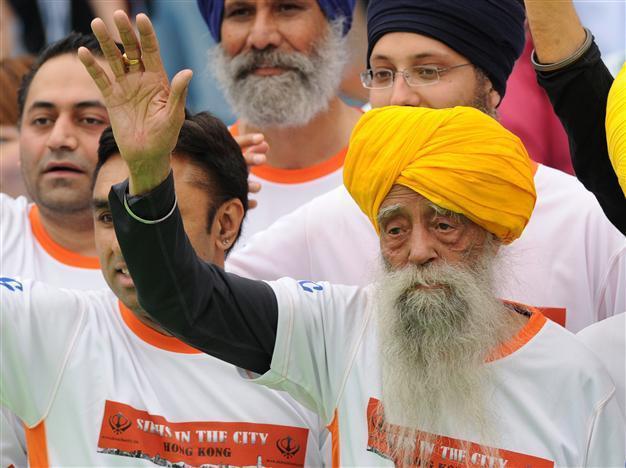Oldest marathon runner finishes last race at 101
HONG KONG - The Associated Press

Indian-born British national Fauja Singh (R) waves to the media after crossing the finish line in the 10-km event as part of the Hong Kong Marathon on February 24, 2013. AFP photo
The world’s oldest marathon runner ran his last race on Sunday at the age of 101.
Fauja Singh finished the Hong Kong marathon’s 10-kilometer (6.25-mile) race in a time of 1 hour, 32 minutes and 28 seconds.
Singh, a Sikh, wore a saffron turban and sported a flowing white beard. As he followed the route along the northern lip of Hong Kong island, he was accompanied by a group from the city’s local Sikh community, joining about 72,000 other runners taking part in the marathon.
The Indian-born runner, nicknamed the Turbaned Torpedo, had said that he would hang up his sneakers after the race in the southern Chinese city, just before his 102nd birthday.
"I will remember this day. I will miss it," Singh said minutes after crossing the finish line.
Singh, a great-grandfather, became the oldest man to run a full marathon at Toronto in 2011, at the age of 100. But his record was not recognized by Guinness World Records because he doesn’t have a birth certificate to prove his age. Singh has a British passport that shows his date of birth as April 1, 1911, while a letter from Indian government officials states that birth records were not kept in 1911.
"I am feeling a bit of happiness and a bit of sadness mixed together. I am happy that I am retiring at the top of the game but I am sad that the time has come for me to not be part of it," Singh said in a pre-race interview. "And there will always be times in the future where I will be thinking, ’Well, I used to do that (running)," the Punjabi-speaking Singh said through his coach and interpreter, Harmander Singh.
Singh took up running as a way to get over depression after his wife and son died in quick succession in India. The death in 1994 of his son took a particularly hard toll on Singh because of its grisly nature. Singh and his son, Kuldip, both farmers, were checking on their fields in the middle of a storm when a piece of corrugated metal blown by the wind decapitated Kuldip in front of his father’s eyes.
Singh, whose five other children had emigrated, was left all alone. "He didn’t think his life was worth living without his son" following the traumatic incident, coach Harmander Singh said. He went to live with his youngest son in London. That’s where the sports enthusiast Singh attended tournaments organized by the Sikh community and he took part in sprints. He met some Sikh marathon runners who encouraged him to take up long-distance running. One day he saw a marathon on television for the first time and decided that’s what he wanted to do too.
In 2000, at the age of 89, he ran the London marathon, his first, and went on to do eight more. His best time was 5 hours and 40 minutes at the 2003 Toronto marathon.
"From a tragedy has come a lot of success and happiness," Singh said before the race as he explained how running has changed his life, allowing an illiterate farmer to travel the world, meet dignitaries and stay in five-star hotels.
Following his retirement from racing, he said he hoped "people will remember me and not forget me." He also wanted people to continue to invite him to events "rather than forget me altogether just because I don’t run anymore."
